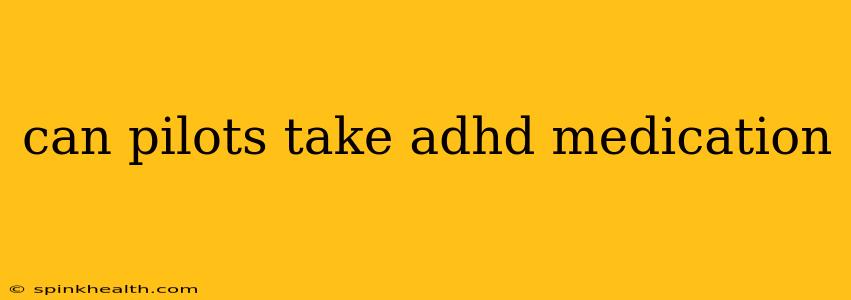Can Pilots Take ADHD Medication? Navigating the Skies with ADHD
The roar of the engines, the precision of the controls, the unwavering focus required – piloting a plane demands peak mental performance. So, what happens when a pilot needs medication to manage ADHD? This is a question with more nuance than a simple yes or no. It's a journey through regulations, individual circumstances, and the very nature of air safety.
Let's start with the core of the matter: Yes, pilots can take ADHD medication, but under very specific conditions. The ability to fly while taking ADHD medication isn't a blanket permission; it's a carefully considered process involving medical evaluations and adherence to strict guidelines set by aviation authorities. This isn't about barring individuals with ADHD from flying, but ensuring the highest standards of safety for everyone on board.
What are the Regulations Surrounding ADHD Medication and Pilots?
The regulations vary slightly depending on the country and the governing aviation authority. However, the general principle remains the same: transparency and medical fitness. Pilots are required to disclose any medical conditions, including ADHD, and the medications they take to their designated aviation medical examiner (AME).
The AME will conduct a thorough assessment to determine if the pilot's condition and medication regimen meet the standards of fitness to fly. This is a crucial step, as the effects of ADHD medication can vary from person to person, and some medications might temporarily impair judgment or reaction time. The AME will consider factors like:
- Type of medication: Not all ADHD medications are created equal. Some have a higher potential for side effects that could impact flight safety.
- Dosage: The dosage prescribed needs to be carefully assessed to ensure it's optimized for managing ADHD symptoms without causing adverse effects.
- Stability of condition: The AME will consider how well the pilot's ADHD is managed and whether their medication regimen is stable and effective.
- Individual response to medication: The AME will evaluate the pilot's personal response to the medication, considering any potential side effects they might experience.
Can ADHD Medication Impair a Pilot's Ability to Fly?
This is a crucial question. While ADHD medication can significantly improve focus and concentration, some medications can potentially lead to side effects like drowsiness, dizziness, or decreased reaction time, all of which are obviously dangerous in an aviation context. This is why the rigorous medical assessment is so important.
The goal isn't to prevent pilots with ADHD from flying; it's about ensuring that the medication they're taking doesn't compromise their ability to perform their duties safely and effectively. Many pilots with ADHD manage their condition successfully and maintain impeccable safety records.
What if a Pilot Develops ADHD After Starting Their Career?
If a pilot develops ADHD after they've already obtained their medical certificate, they must immediately report this to their AME. The AME will then assess the situation and determine the appropriate course of action, which might involve adjustments to the pilot's medication, restrictions on flight duties, or, in some cases, temporary or permanent grounding. The process is designed to prioritize safety while considering individual circumstances.
What are the Long-Term Implications for a Pilot with ADHD?
The long-term implications depend largely on the individual's response to treatment, the effectiveness of their medication management, and their ongoing cooperation with their AME. With proper management and ongoing monitoring, many pilots with ADHD can maintain successful and safe flying careers. Regular check-ups and open communication with their AME are critical to ensuring continued airworthiness.
In conclusion, the question of whether pilots can take ADHD medication is complex. It’s not a simple yes or no, but rather a careful balancing act between managing a medical condition and ensuring aviation safety. With responsible management, transparency, and a collaborative approach with medical professionals, pilots with ADHD can often lead fulfilling and successful careers in aviation.

